|
|
 |
|
FOR I AM A JEALOUS PARROT:
I WILL HAVE NO OTHER BIRDS BEFORE ME,
NOT EVEN A PICTURE OF OTHER BIRDS
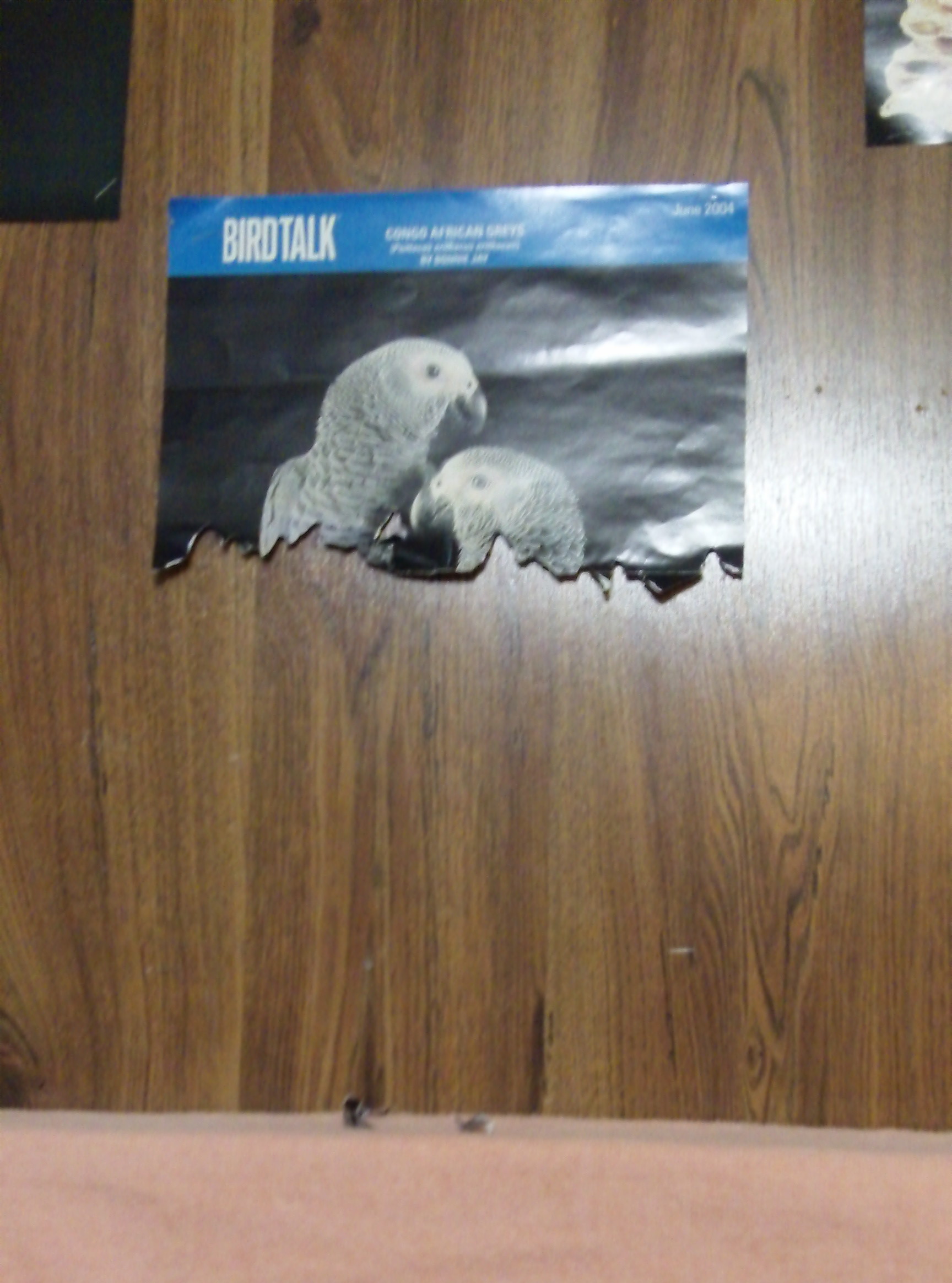
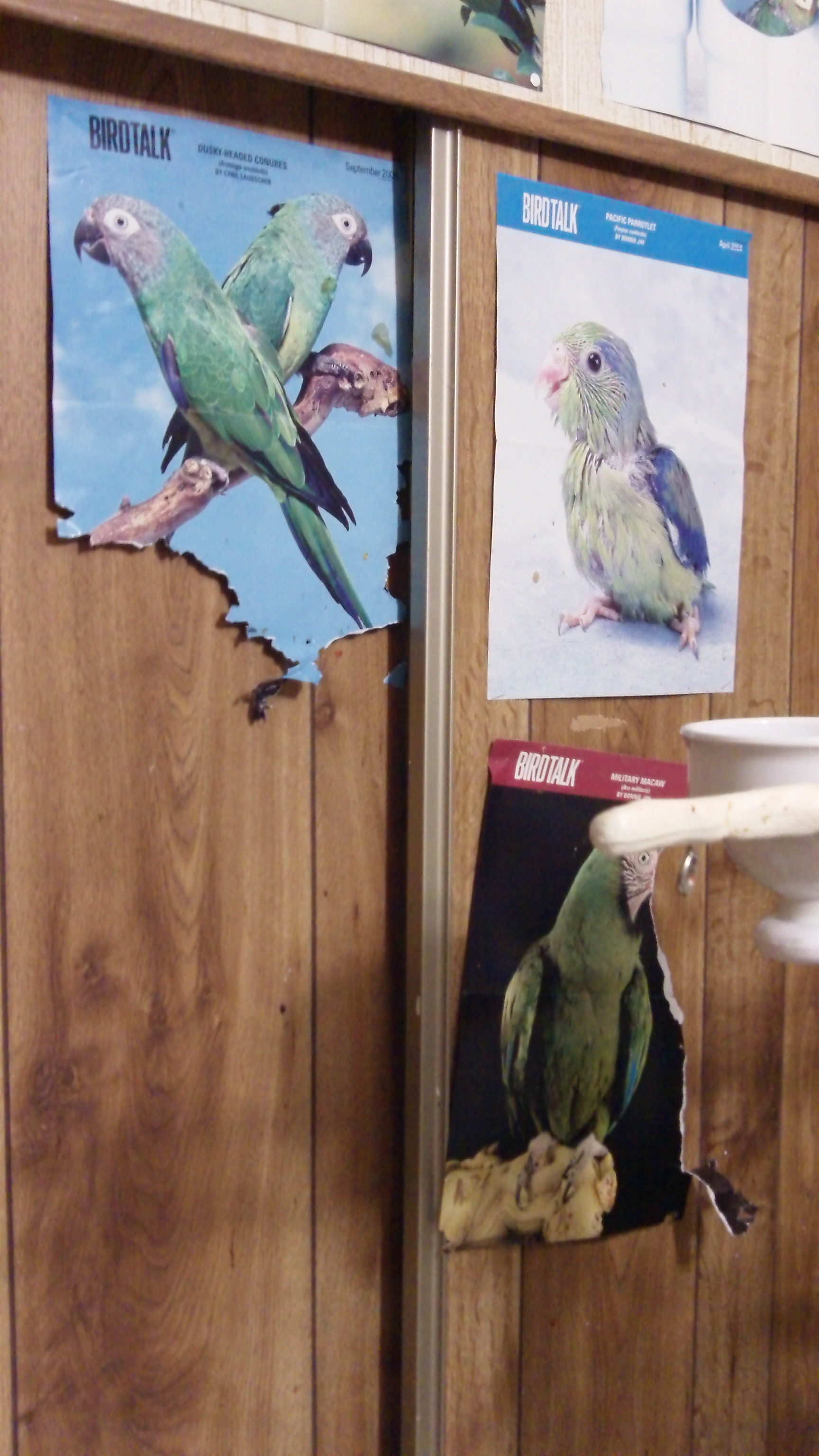
click here for a video of Ziggy playing "socks"
MUSIC TO SOOTHE THE SOULS OF SAVAGE BEASTS
(AND EVEN PARROTS)
I make cds for Ziggy to listen to; he tells me what songs he likes by asking me if I like them
or by saying "that's pretty." He likes instrumentals, vocals, and anything with whistling in it. He also
enjoys saxophone and piano music. He likes Santana, Acker Bilk, Bert Kaempfert, and just about any good vocalist,
male or female--anything that's pretty. He seems to be partial to Patsy Cline.
When you talk with parrot owners, you will inevitably find out that by "coincidence," the owner
will tell you that parrot likes whatever kind of music the owner does. If the owner likes country music and hates classical
music, then "so" does the parrot. I enjoy at least some of most genres, so I think I can observe Ziggy's
behavior fairly independently. Although I enjoy what he likes, he doesn't always feel the same about my likes, so I
have to listen to certain music when I'm away from him.
When I leave the house, I usually leave the TV on with the sound off, but with his cd player on. Odd sounds from
the TV can upset him, and even some bird and animal sounds on the World Parrot Trust's "PollyVision" will put him into alert
mode. The PollyVision DVDs were made especially for parrots to watch--to keep the birds occupied while their owners
are away. Since watching PollyVision, he spends more time rooting around on the bottom of his parrot gym; he now has
the bad habit of flying down to the actual floor sometimes, which he never used to do. This is probably the result of
watching the DVD birds doing so much ground feeding. Ziggy seems particularly calm after watching
the weather channel; he likes the blue screens. One time, after the screen had changed to a mostly blue screen, he turned
to me and said, "That's pretty, Dad." He and I obviously have different opinions when Microsoft's infamous "blue screen of
death" manifests itself, as it always does, sooner or later, in some kind of permutation.* [Vista
was such an improvement: instead of blue screens with error messages, everything would dim, the title bars would read
"Not responding," then Windows® would go online to try and find a solution to the problem, which it wouldn't find, of course.
Then you could close the program...but at least you didn't have to reboot the computer as often. Win7 was quite an improvement,
but then I made the horrible error of getting a Win8 laptop, and, there I was, back in the same pit of WinMe and Vista. It
looks like every other version of Windows® is decent.]
| ZIG WARNS A TV BIRD NOT TO GET TOO CLOSE |
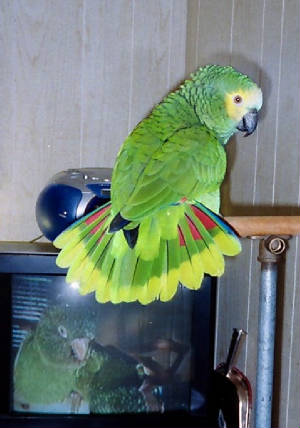
|
| WATCH OUT FOR THAT BEAK WHEN YOU SEE THOSE TAIL FEATHERS SPREAD |
He definitely does pay attention to the TV. The picture above shows him displaying at television
birds, warning them not to get near. We had been watching a videotape that was intended by its producer
to teach parrots to speak certain phrases. Why that tape put him into attack mode, I don't know, because he
doesn't display at any of the birds on the Pollyvision DVDs. Maybe he was reacting to the man on the tape
instead of to the birds. He does give out an alarm cry when he sees hawks or other predators on Animal Planet.
In the picture below of him watching dog whisperer Cesar Millan, you can see Ziggy's television and cd player. All
electric cords are inaccessible. A thick sheet of Lexan® is in back of the electronics to protect the cords, and access
is also blocked from the top. There is an uninterruptible power supply (UPS, or battery backup), so that if the power
goes off his music will continue to play.
I can't stand the idea of "companion" birds being locked in cages without visual or audio stimulation while their
owners are gone. How could an intelligent being do anything but go crazy in such circumstances?
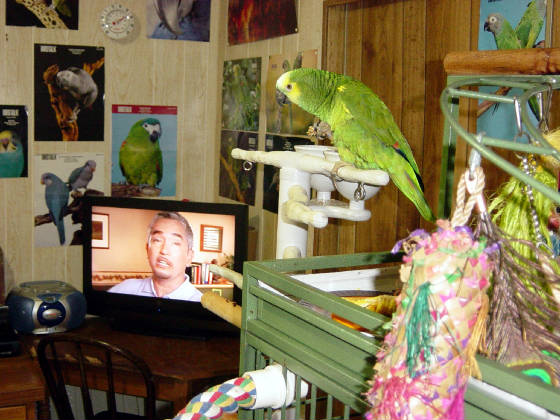
|
| WATCHING CESAR MILLAN WHILE MUNCHING ON A TREAT |
QUIRK #1: SOCKS
Plain white socks are a delightful, inexpensive way to interact with your bird. Ziggy and
I play catch and tug-of-war with old white socks. He always wins, of course, at tug of war. If I take too long to let
him win, his tail feathers will start spreading little by little--my clue that it's time to let go. Playing catch, sometimes
he can catch 2 or 3 socks at the same time: he's talented!
Unfortunately, he'll attack any white clothing now. I have inadvertently made white cloth into
a lure. He is just like a child, and gets totally involved in our games of "socks."
This can be disconcerting if I forget and walk by him after removing clothes from the dryer; sometimes
I don't realize it until he is in mid-air and almost upon the white clothing, forcing me to either drop everything
or else turn 180 degrees quickly to avoid him. Those socks are HIS! I can throw a sock toward
him while he is in mid-air, and he'll catch it in mid-air: his grandfather must have been an eagle!
When he does grab the socks, it is with a "grab-bite," and not a "kill-bite," but it can cause a bruise if his beak catches
skin instead of sock.
Another unfortunate consequence of the sock-grabbing: sometimes when I am relaxed on the bed,
Ziggy will decide to be a "sneak bird," and attack the sock on my foot, which suddenly acquires holes. He
seems to be very proud when he conquers the evil sock. (Lately, I've had to protect my feet from him even if I am barefooted.)
Because Ziggy seems to be so happy and so involved when we play "socks," and because he actually gets
some exercise when we play--including a lot of wing flapping--we play several times a day. Other than eating, it seems
to be his favorite activity these days. At least he has fun.
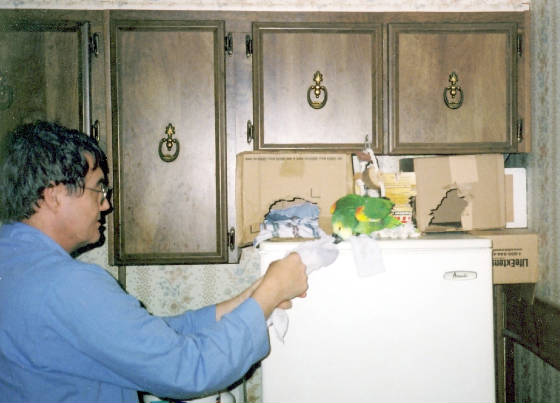
|
| PLAYING TUG-OF-WAR USING AN OLD SOCK |
|
 |
ZIGGY: OTHER QUIRKS AND BEHAVIOR
The purpose of providing these details is to assist anyone who
might have to handle him after my demise. I want to protect Ziggy (as well as whoever might have to handle him.)
He's not just a "dumb animal." Failure to understand his history and psychology would probably doom any potential relationship
between him and another human.
He is more territorial than a hand-raised parrot. You cannot disturb anything in his vicinity
of his cage or parrot gym without inviting his ire. I have to be careful even when doing something as simple as
removing a paper that has a dropping on it. I have to tell him what I am doing and why, all the while admiring
him, especially his beautiful tail feathers that are slowly spreading out as an involuntary indicator of his rage; I
have to either be super quick or super slow. To do any serious cleaning, he has to be in another room.
Ziggy does have a lot of quirks. Attacking and grabbing any
white cloth that comes near him is my fault: I had
been trying to find something interactive to do with him. Knowing that parrots grab a lot and love to play, I
tried him out on an old sock, and it worked: it more than captivated his interest. It's up to me now to remember
to be careful about loose white clothing.
He is very particular about what I wear. I bought some flip-flops
once, but was only able to wear them for a few moments; he tried to attack them. I have to be careful with outerwear;
he doesn't approve of overcoats. He gets especially angry if he sees me in my heavy black-hooded jacket; I
think it sets off his "crow" alarm--he doesn't like crows. There are a couple of shirts he doesn't like either.
I had a reddish shirt for years that he didn't mind, but a new plaid red one sets him off instantly. Someone wearing
a pattern like that might have done something bad to him in the past. I cannot surprise him with my face covered with
shaving cream, either; apparently, I'm not "me" if my face has that white stuff on it.
My mother had Ziggy for almost 20 years. She gave
him to me because she couldn't keep him from biting. He had been biting her a little for a number of years, but after
an actual attack (not just a simple bite), she realized that she could no longer handle him. He had
flown to the top of her head and begun biting and slashing any flesh he could reach with that buzz saw beak; one of her
knuckles was severely damaged as a result. He could easily have severed an artery in her neck had I not
pulled him off of her.
All my mother had been trying to do was to carry him from one
room to another; unfortunately for her, at that moment he didn't want to be handled. He was probably grouchy from
lack of sleep as well as angry at having just been boarded for a week. My mother lived outside a very
small town, and it had been a long drive the previous evening to pick him up, so he got to bed late. She was so
happy to see him at the boarding place (a pet store) that she insisted on letting him out then and there despite his
warning (his pupils were pinning, his tail-feathers were spread, and he was prancing) as well as my warning
(when I saw him displaying, I knew what would happen, but my mother's affection overwhelmed her reason)--resulting in a
nasty bite. He remained angry at her until the day she died; the instant he would see her, he would start displaying
at her, no matter how much she and I would try to calm him.
He was probably angry at having been, as he would
have seen it, abandoned for a time. Parrots are social animals; they don't leave their flocks for extended periods
of time. My mother--part of his "flock"--did not have his permission to leave: Ziggy is the boss. To
my mother, it was not conceivable that a pet animal could question the "natural order of things"--i.e., her being the boss.
An exacerbating issue might have been Ziggy's long-standing resentment at having been the #2 parrot in a household where
parrot #1 received extremely preferential treatment. Another possibility
is that he might have thought that my mother had something to do with my father's death. When he died, Ziggy was in the room,
as, eventually, were the paramedics, and, having seen my mother and others around my father's body, he might have concluded
that she and they were responsible for the death. Whatever the
reason(s), when I took Ziggy to visit my mother, I could not allow him to be out in the same room as her: he would go
straight into attack mode and make a beeline for the top of her head.
After my mother died, I took him to the funeral home to see her in her coffin, so he would
know what happened to her. That last time he saw her, he did not display at her at all. He knew.
| HE'S A LEFTY |
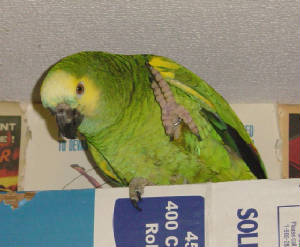
|
| THE RAISED FOOT, IN THIS CASE, MEANS "GET THAT CAMERA AWAY FROM ME!" |
You cannot "make" Ziggy do something he doesn't want to do. If you want Ziggy
to do something like getting him to go to a different room, you can't just walk over to him, pick him up, then carry
him elsewhere. You have to ask him first, and he might acquiesce, but if he wants to stay where he is, he will
probably bite if you persist: Ziggy is the master of all he surveys, and you have to respect him. He does
not bite without warning. My mother, of course, did not understand that he could possibly be disobedient to her,
since, in her world, disobedience was contrary to the natural order of things.
I have a simple way to deal with such issues: I make him think that whatever I want him
to do is his idea. If I want him to go to a different room, all I have to do is walk out of the room, and within
a minute or two he will start calling for me. When I re-enter the room, he will usually be impatiently waiting
on his portable perch, acting for all the world as if he can't understand why I didn't take him with me in the first place.
On the extremely rare occasion that instantaneous action is required, all I have to do is use my command voice.
Don't get the wrong idea about his behavior: he is as sweet to me as you could imagine
(unless you've had a parrot.) He preens my eyebrows, chest hairs, etc.
| ALLOPREENING |
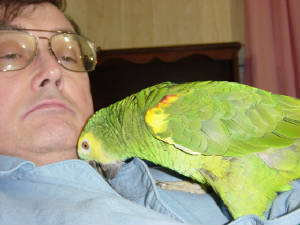
|
| ZIGGY PREENS MY CHEST "FEATHERS" |
I have to spend a lot of time allopreening with him, especially cleaning off the shafts of new
feathers on his neck and head during molting season. He has always had a feather problem: some feathers always come
in too hard, so that the outer shaft is almost impossible to remove, particularly on the back of his neck, but he has the
opposite problem with other feathers: their outer shafts never get properly hard, even weeks later. His yellow
feathers always come in perfectly, but a green one a couple of millimeters away might be a problem feather.
He has picked feathers for many years, and has bald spots underneath his wings and on his back between his wings.
The feathers that stay soft are the ones he plucks. I can see how the abnormal feathers would bother him; you know
how parrots are about things that "don't belong," like eyeglasses, buttons, moles, scabs, etc. I suspect that he has
a biochemical abnormality, possibly a genetic condition. I have been unable to get any parrot experts or vets
to consider that such a possibility might exist. Increasing the amount of biotin in his diet seems
to have reduced the incidence of hard shafts, but the soft shaft problem continues. [Note: since his long-standing liver issue
has reared its ugly head again--in late 2009--his new vet has suggested to me that this abnormality of feather growth could
have been his liver the whole time, although there has to be a psychological component also.]
There is obviously a psychological component to his feather picking. When he drops a large
feather, he and I can play with it as though it were a toy. He knows I save his large feathers, and when
a large one falls out, he will sometimes actually hold it in his beak and hand it to me. But if I show him a feather
he wasn't supposed to have plucked, he will know that he wasn't supposed to have picked it, and he will get all
slicked down, try to grab it, and if successful, will shake it in his beak belligerently. My mother used to fuss at
him about the feather picking, and when I show him one of the not-supposed-to-be-picked feathers, he will repeat my mother's
scolding. There may have been exacerbating physical conditions also, such as having been around cigarettes until
I got him.
When my fingernails don't work to clean a new feather shaft, I have gotten him accustomed
to me scraping the new shaft with a dull sabre saw blade while using a piece of plastic on the other side of the
feather to do the scraping against.
When I arrived home with Ziggy for the first time, he started trying to
regurgitate. I didn't know how to react to that; my only knowledge of parrots doing that around their humans was
from the Joanna Burger book "The Parrot Who Owns Me" (although wildlife documentaries make it apparent that regurgitation is a sign of avian affection
as well as a natural feeding process.) When I was growing up, my family had parakeets (budgies) and, occasionally,
wounded or orphaned wildlife (illegally, we discovered decades later), but I was not sure at first if Ziggy's behavior
was pathological or just affection.
When it happened, though, I had a flash of inspiration, and put my forefinger in Ziggy's
beak and started gently rocking his beak up and down, as much like another bird would do as I could imagine. His reaction
made it obvious that his regurgitating was a sign of affection: he liked that, and now he often DEMANDS that I
"burp" him like that after we have eaten. He will yell for me, and misbehave if I don't come immediately to
"burp" him. While he is being "burped," he usually comments on how good the food is the second time around. Doing
it this way, as long as I keep his head angled up, he doesn't lose any of the food, and there are no aesthetically awkward
"deposits" to handle. The more delicious the food, the more likely he is to demand a "burping."
CLICK HERE TO PLAY VIDEO: THE FOOD I GIVE HIM IS SO GOOD, HE INSISTS ON OFFERING IT BACK TO ME!
Most parrot handlers would probably attribute his behavior issues to what they call "Amazon overload,"
but that doesn't really explain anything--it just gives it a name. I'm not sure when this syndrome surfaced, but I note
that in a 1983 book by a Dr. Edward Mulawka, "Blue-Fronted Amazon Parrots," there is no mention of such behavior.
In fact, the book states, "The main reason why they [blue-fronts] are preferred above all others is their gentleness....Its
docility is legend....Because of this docility they can be trusted not to bite." This statement made me question the
authenticity of the book. I find it difficult to believe that blue-fronts could have been universally regarded
as docile until the last couple of decades, when they suddenly emerged as one of the "terrible three" most
hot-tempered parrots. I doubt that there has been a sudden evolutionary change in the species.
I did a Google search on Dr. Mulawka, and although there are numerous sites selling his books,
I found no information on him as a person, which is highly unusual in the case of an author. I contacted
the original publisher, and they state that they are no longer in contact with him. Considering the puzzling statement
about blue-front docility, I am beginning to wonder if a "team" at the publisher might have created the book
using Dr. Edward J. Mulawka as a pseudonym.
Ziggy's behavior issues may have begun before my mother got him. She said that he had
been in a separate cage from a group of other blue-fronts at the pet store, and she speculates that he may have been bought
previously and returned to the store. What convinced her to buy him was how he stole her car keys
at the store, and how proud he seemed to be of that feat.
BEHAVIORAL PUZZLES
I should mention that Ziggy is peculiar about water: I've only seen him drink water twice
since I've had him. Until I started putting juice in one of his cups, most of his fluid intake was from celery and other
produce. I do leave him good water anyway. He doesn't like baths, either, so he has to have involuntary showers. He is more
likely to behave if he gets rewarded with a tiny bite of low-fat cheese afterward. (I have to promise him that if he's
good, I'll give him a bite of cheese.)
What is really peculiar is that, toward the end of his shower or misting he'll tell
me "that's good." He hates misting more than he hates showers. I speculate that something unpleasant
happened to him that involved water. My mother had to board him a few times because of her medical problems, and
I wonder if someone doused him with water or some other liquid to try and shut him up or stop some other behavior. Another explanation
for his aversion to drinking water might be the fact that, when he first started feather picking, back in the late 1980s,
my mother's vet at the time blamed it on an allergy, and recommended that she put Benadryl in his drinking water. Well, if
somebody were to put Benadryl in my drinking water, I'd also find something else to drink. Now, in 2013, he is actually starting
to drink water again more normally.
I'd like to get an explanation for what sometimes occurs when I offer him fruit
juice in a glass or cup. Like any normal parrot, he loves fruits and juices, and squeezes his own juice out of
pieces of orange. To keep juice from getting all over him, I cut beak size pieces for him. But if I offer him fruit
juice in a glass or cup, he'll tell me "that's good" or "yum yum good," but he will often then lunge at the glass to
attack it. Sometimes, he'll drink the juice immediately. After plenty of assurance that what's in the
cup is good, he will usually drink it. It's not the glass that he's reacting to because he will always
drink lactose-free milk out of the same glass without attacking it. He seems more likely to try to attack the glass
when he has seen me pour the juice into it from a large container than when I bring him one that I have filled
in a different room. I'm puzzled. If anyone can explain this behavior, please email me.
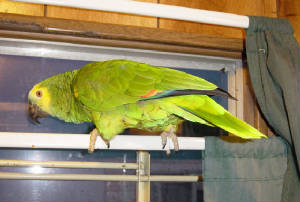
|
| WHAT'S GOING ON OUTSIDE? |
CLICK HERE TO SEE BUDDY DEMOLISHING SOME BALSA WOOD
PINE CONES TO HELP DEAL WITH CHEWING ISSUES
Things are going to get chewed on when you have a parrot. If you are one of those people
for whom the main purpose of having a house is for it to be looked at and admired instead of being lived in, then
a parrot is not for you. If you value things more than feelings, then a parrot is not for you.
Some bird owners actually try to stop their bird from chewing things. We all know
it can be a problem--buttons removed from shirts, chewed up furniture, etc. But there are healthy options that
help keep beaks trim. I have never taken him to a vet to get his beak (or nails) trimmed; he gets his trimmed naturally,
the way nature intended. Cuttlebones help, of course, as well as light wood pieces from the hardware store.
Pinecones make a wonderful addendum to your bird's surroundings and provide extended chewing opportunities.
I get Ziggy's pinecones from Columbia Pines & Botanicals. Their source is a national
forest, so the cones should be pesticide-free. They recommend Jeffrey pinecones for their own birds. If your bird is
not experienced with pinecones, either get cones without sharp points or else cut the tips off the pine "scales"
before giving the cone to your bird. Visit Columbia Pines at http://www.pinecones.com/.
Ziggy's new companion, Buddy, is not so easy to distract from his mandatory destruction of the
surroundings, even with pine cones and cuttlebones. I am beginning to think that a more appropriate name for him might
be "Demon Seed" or something. I had to buy wooden planks to cover up certain areas; Ziggy's had me spoiled all these
years with his good behavior. I buy balsa wood from hobby shops for Ziggy to demolish--on occasion--but Buddy's "carving"
is too profligate for that sort of expenditure.
| Left, Buddy looks up from his carving work |

|
| Right, a few of the 1"x10" white pine planks he has demolished |
BIRD TOYS
eBay vendors are good sources; and am more than satisfied with the products of A Bird Toy, for example.
|
 |
|
|
 |
|
|
 |
|
|
 |
 |
 |
|
|
This is a personal web site, not a business. If you find
any of the information here useful, please consider a donation. Help keep Ziggy the most spoiled parrot in North America!
Thanks.
All content on this site, including pictures, is copyrighted,
©2006 through 2016, by George A. Butel. All rights are reserved; text may be quoted
freely with attribution, but critical commentary must give me the opportunity to reply.
|
Visit our hints for cancer patients Google page, which tells you some of the things I learned during cancer treatment, including
a few things that "they" forget to tell you, such as having to be a little bit "anal" about trying to prevent opportunistic
infections. I never had any during my treatment, so I think my obsession paid off.
LEGAL STUFF
This site has tips and observations about dealing with parrots,
and a few of my own views about human and parrot health concerns. I have a degree in biochemistry, so I am qualified to make
some statements about foods, medicines and supplements, but I am neither a veterinarian nor a physician, and I do
not practice human or veterinary medicine. You should certainly double-check any ideas you might get from me, or anything that
you might construe as advice, by consulting with an appropriate legally licensed professional. All content
on this site ©2006 through 2014 by George A. Butel. If you see any typos or any information that you feel is inaccurate
or ambiguous, please contact me by clicking here.
I use some free Google stuff, including their search, on this site, and they now require that their privacy policy be listed:
Google, as a third party vendor, uses cookies to serve ads on your site.
Google's use of the DART cookie enables it to serve ads to your users based on their visit to your sites and other sites on
the Internet.
Users may opt out of the use of the DART cookie by visiting the Google ad and content network privacy policy.
|
|
|
|



